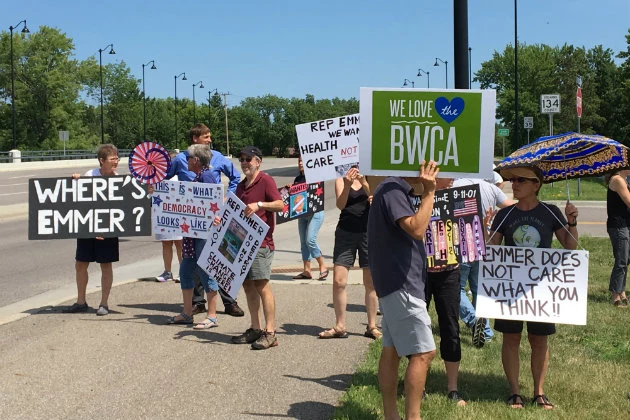Minnesota Secretary of State Steve Simon said Friday that he won’t fulfill a request from a presidential panel to ship voter registration information for some 4 million Minnesota voters to Washington.
Simon questioned both whether Minnesota law would allow him to provide the information to President Trump’s Election Integrity Commission and to what end it would be used.
“When Minnesotans registered to vote, they didn’t ever think their personal information would end up in some federal database in Washington, D.C.,” said Simon, a DFLer elected to his statewide post in 2014.
Kansas Secretary of State Kris Kobach and Vice President Mike Pence are overseeing the commission, which Trump established in May to explore his unfounded claim that millions of people voted illegally in the last election. In a letter Thursday, Kobach asked election chiefs in every state to provide, if public, the names of registered voters, party affiliation, last four digits of Social Security numbers, voting history back to 2006, felony convictions, military history and voter registration in another state.
Several Minnesota Republicans criticized Simon for declining to turn it over. State Sen. Mary Kiffmeyer, R-Big Lake, a former secretary of state, said Simon should “stop obstructing the president in his quest to strengthen voter integrity. Minnesotans gain nothing by pretending no one in our state ever votes illegally, but we have a lot to gain by making sure every legal vote counts.”
“It should be a shared goal of Democrats and Republicans to ensure integrity and fairness in our elections and protect the concept of ‘one person, one vote,’ ” Minnesota House Speaker Kurt Daudt said in a statement. “To be clear: The commission is not asking for anyone’s private personal data, or anything that is not already publicly available.”
Some of the information requested by the commission isn’t collected in Minnesota. Other information isn’t actually public. For example, birth year is public, but not birth date. Minnesotans also aren’t required to register with a political party.
It’s not just what the commission wants that concerns him, Simon said, but why they want it. Minnesota law limits the purposes for which voter data can be purchased and used. The law specifically allows data to be provided for political purposes and law enforcement. If it were the Department of Justice requesting the information, Simon said, “we might be having a different discussion.”
Numerous states are declining the commission’s request in full or in part — and not just states controlled by Democrats. California, Virginia, Kentucky, Massachusetts and New York have said they won’t provide the information. In many other states, including Kobach’s home state, leaders have said they will fulfill parts of the request.
In a statement Friday to the Washington Post, a spokesman for Pence defended the letters.
“The commission very clearly is requesting publicly available data in accordance with each state’s laws in an effort to increase the integrity of our election system,” said the spokesman, Jarrod Agen. “The commission’s goal is to protect and preserve the principle of one person, one vote because the integrity of the vote is the foundation of our democracy.”
In his letter, Kobach said the data will be used to “fully analyze vulnerabilities and issues related to voter registration and voting.”
Kobach asks for a response by July 14 and indicates that submitted information will be made public. The commission will meet for the first time July 19.
Simon doesn’t dispute the public nature of some of the data — just the purpose and the motives of the commission. “It sure doesn’t look to me like an objective investigation based on who’s running it and what they’ve already said,” Simon said.
Simon noted that Pence and Kobach have publicly supported Trump’s claims that millions of votes were illegally cast in the recent presidential election. The claims of massive voter fraud usually raise the specter of voting by dead people, felons and immigrants.
“This is only an exercise to make a public case for some form of national voter restriction,” said Dan McGrath, executive director of TakeAction Minnesota. He added that the commission is “a big Kabuki play designed to question the legitimacy of our democracy.” The organization fought a constitutional amendment in 2012 that would have required voters to bring ID with them to the polls. Minnesota voters rejected the amendment.
McGrath argued that Kobach has made a career out of “advancing a case of voter fraud” to restrict voting. To give the commission “any air of legitimacy is a mistake,” McGrath said.
Read the rest of the article here.




